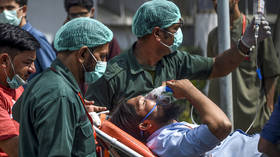Soybean dust blamed for 14 mysterious deaths in Karachi, locals protest poor government response

An illness which affects the lungs and has killed 14 people and hospitalized over 200 in Karachi, may have been caused by soybean dust, a lab has said. It has sparked street protests and prompted some to leave the city.
The health crisis in the Pakistani city started on Sunday night as people living near the port of Karachi complained about breathing problems, tightness in the chest, and a burning sensation in the eyes. Other symptoms include dizziness and nausea. Some reported smelling an unfamiliar odor before feeling sick.
The mysterious illness, which was initially blamed on a gas leak, soon proved to be fatal. On Monday eight people were reported dead, while on Tuesday the death toll rose to 14. More than 250 people were treated for lung problems before being discharged, local hospitals said, while a handful remained in intensive care.
Karachi Commissioner Iftikhar Shallwani said the outbreak was a localized event affecting an area near the port. While no cause was immediately identified, city health officials said hydrogen sulfide could have been responsible. The colorless gas notorious for smelling like rotten eggs is toxic – it was even used as a chemical weapon during WWI – and may be released during improper handling of oil products.
Pakistan’s International Center for Chemical and Biological Sciences (ICCBS) said its study of blood and urine samples taken from affected patients as well as environmental samples from the area pointed to another cause, overexposure to soybean dust.
Dust clouds released during the unloading of soybeans from cargo ships caused a string of asthma outbreaks in Barcelona, Spain in the 1980s. Improvement of safety rules managed to curb such incidents.
Also on rt.com Pakistan set to import anti-locust chemicals from India after UN issues 'TWIN INVASION' alert – reportThis explanation was considered from the start since a cargo of soybeans was unloaded in Karachi at about the same time as reports of the illness began. City authorities ordered the ship to leave the terminal as a precaution while an investigation got under way.
Whatever the cause, the crisis has affected day-to-day life in the area. Many private and public schools remained closed on Wednesday while those that remained open had many students missing. Local business owners preferred to keep shops closed rather than risk exposure.
Some people were angry at the authorities, blaming them for a poor response. Dozens staged mass protests on Tuesday near Keamari’s Jackson Market, bringing traffic to a standstill. They demanded answers about what had happened and who will be held responsible for the deaths. There is currently a criminal investigation into the incident; no suspects have yet been named.
Other residents chose to ignore government assurances that no evacuation from the area was necessary and left the area.
KARACHI: Chemical and nuclear specialists from the armed forces arrived at the Keamari locality of the port city on Tuesday as the death toll from the as yet unidentified gas leak climbed to 14.#KarachiGasLeakhttps://t.co/I7ozATneOZ
— سیدہ ودیعہ انور 🇵🇰❤️🇵🇰 (@SyedaWadiaAnwar) February 19, 2020
The hectic situation was aggravated by a conflict over jurisdiction. The local government said it had no authority to monitor facilities at the port, which is managed by the Karachi Port Trust (KPT) and the Pakistan Navy, and by extension the federal government.
Think your friends would be interested? Share this story!














